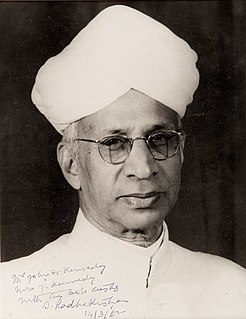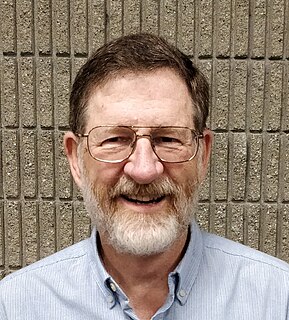Related Research Articles
Hinduism is an Indian religion and dharma, or way of life. It is the world's third-largest religion, with over 1.25 billion followers, or 15–16% of the global population, known as Hindus. The word Hindu is an exonym, and while Hinduism has been called the oldest religion in the world, many practitioners refer to their religion as Sanātana Dharma, which refers to the idea that its origins lie beyond human history, as revealed in the Hindu texts. Another, though less fitting, self-designation is Vaidika dharma, the 'dharma related to the Vedas.'

Sarvepalli Radhakrishnanpronunciation (help·info) was an Indian academician, professor, politician, philosopher, and statesman who served as the first Vice President of India (1952–1962) and the second President of India (1962–1967).

The historical Vedic religion, and subsequent Brahmanism, constituted the religious ideas and practices among some of the Indo-Aryan peoples of northwest India of ancient India during the Vedic period. These ideas and practices are found in the Vedic texts, and some Vedic rituals are still practiced today. It is one of the major traditions which shaped Hinduism, though present-day Hinduism is markedly different from the historical Vedic religion.

Shaivism is one of the major Hindu traditions that worships Shiva, also called Rudra, as the Supreme Being. It is considered to be the oldest living religion in the world. One of the largest Hindu denominations, It incorporates many sub-traditions ranging from devotional dualistic theism such as Shaiva Siddhanta to yoga-oriented monistic non-theism such as Kashmiri Shaivism. It considers both the Vedas and the Agama texts as important sources of theology.

Ugadi or Yugadi, also known as Samvatsarādi, is the New Year's Day for the States of Andhra Pradesh, Telangana, Karnataka in India. It is festively observed in these regions on the first day of the Hindu lunisolar calendar month of Chaitra. This typically falls in April month of the Gregorian calendar.
Hindu texts present diverse and conflicting views on the position of women, ranging from feminine leadership as the highest goddess, to limiting gender roles. The Devi Sukta hymn of Rigveda, a scripture of Hinduism, declares the feminine energy as the essence of the universe, the one who creates all matter and consciousness, the eternal and infinite, the metaphysical and empirical reality (Brahman), the soul, of everything. The woman is celebrated as the most powerful and the empowering force in some Hindu Upanishads, Sastras and Puranas, particularly the Devi Upanishad, Devi Mahatmya and Devi-Bhagavata Purana.

Wendy Doniger O'Flaherty is an American Indologist whose professional career has spanned five decades. A scholar of Sanskrit and Indian textual traditions, her major works include, 'The Hindus: an alternative history'; Asceticism and Eroticism in the Mythology of Siva; Hindu Myths: A Sourcebook; The Origins of Evil in Hindu Mythology; Women, Androgynes, and Other Mythical Beasts; and The Rig Veda: An Anthology, 108 Hymns Translated from the Sanskrit. She is the Mircea Eliade Distinguished Service Professor of History of Religions at the University of Chicago, and has taught there since 1978. She served as president of the Association for Asian Studies in 1998.

The Eastern religions are the religions that originated in East, South and Southeast Asia and thus have dissimilarities with Western, African and Iranian religions. This includes the East Asian religions, Indian religions as well as animistic indigenous religions.

Michael Witzel is a German-American philologist, comparative mythologist and Indologist. Witzel is the Wales Professor of Sanskrit at Harvard University and the editor of the Harvard Oriental Series.
The history of Hinduism covers a wide variety of related religious traditions native to the Indian subcontinent. Its history overlaps or coincides with the development of religion in the Indian subcontinent since the Iron Age, with some of its traditions tracing back to prehistoric religions such as those of the Bronze Age Indus Valley Civilization. It has thus been called the "oldest religion" in the world. Scholars regard Hinduism as a synthesis of various Indian cultures and traditions, with diverse roots and no single founder. This Hindu synthesis emerged after the Vedic period, between ca. 500–200 BCE and ca. 300 CE, in the period of the Second Urbanisation and the early classical period of Hinduism, when the Epics and the first Purānas were composed. It flourished in the medieval period, with the decline of Buddhism in India.

Smarta tradition (स्मार्त) is a major Hindu denomination that developed during its classical period around the beginning of the Common Era. It reflects a Hindu synthesis of four philosophical strands: Mimamsa, Advaita, Yoga, and theism. The Smarta tradition rejects theistic sectarianism, and it is notable for the domestic worship of five shrines with five deities, all treated as equal – Shiva, Vishnu, Surya, Ganesha, and Shakti. The Smarta tradition contrasted with the older Shrauta tradition, which was based on elaborate rituals and rites. There has been considerable overlap in the ideas and practices of the Smarta tradition with other significant historic movements within Hinduism, namely Shaivism, Brahmanism, Vaishnavism, and Shaktism.
In Hinduism, Rishabha is one of the twenty four avatars of Vishnu in the Bhagavata Purana. Some scholars state that this avatar is same as the first Tirthankara of Jainism. According to eminent historian D. N. Jha, jain Tirthankar was appropriated as an avatar of Vishnu and son of Manu by the vaishnavas and brahmins to convert Jains. Shaiva texts like Linga Purana appropriated Tirthankar Rishabhdeva as an avatar of lord Shiva. Rishabha is also found in Vedic literature, where it means the "bull" and is an epithet for Rudra (Shiva).

Wesley Kent Fuchs is an American university professor and academic administrator. He is the current president of the University of Florida in Gainesville, Florida. Upon taking office on January 1, 2015, he became the university's twelfth president. He previously served as the provost of Cornell University from 2009 through 2014.

Sri Vaishnavism, or the Sri Vaishnava Sampradaya, is a denomination within the Vaishnavism tradition of Hinduism. The name refers to goddess Lakshmi, as well as a prefix that means "sacred, revered", and the god Vishnu, who are together revered in this tradition.
The notion of a fifth Veda, that is, of a text which lies outside the four canonical Vedas, but nonetheless has the status of a Veda, is one that has been advanced in a number of post-Vedic Hindu texts, in order to accord a particular text or texts and their doctrines with the timelessness and authority that Hinduism associates with the Vedas. The idea is an ancient one, appearing for the first time in the Upanishads, but has over the centuries since then also been applied to more recent Sanskrit and vernacular texts.

Ashta Lakshmi or Ashtalakshmi are a group of eight manifestations of Devi Lakshmi, the Hindu goddess of wealth. She presides over eight sources of wealth: "Wealth" in the context of Ashta-Lakshmi means prosperity, fertility, good fortune or good luck, good health, knowledge, strength, progeny and power.
Hindu studies is the study of the traditions and practices of the Indian subcontinent, especially Hinduism. Beginning with British philology in the colonial period, Hindu studies has been practiced largely by Westerners, due in part to the lack of a distinct department for religion in Indian academia. Since the 1990s this has caused some dissent from Hindus, raising questions in academia about the role of Hindu studies in creating postcolonial images of India.
Heinrich von Stietencron was a German Indologist. He was a Professor and the Director of the Institute of Indology and Comparative Religion at the University of Tübingen. He was a life member of the Academy of Sciences, Heidelberg and an honorary member of the Société Asiatique, Paris. He was awarded the Padma Shri by the President of India in 2004.

Richard A Yost is an American scientist and a professor at the University of Florida. He is best known for his work inventing the triple quadrupole mass spectrometer. Yost received his BS degree in Chemistry in 1974 from the University of Arizona, having performed undergraduate research in chromatography with Mike Burke and his PhD degree in Analytical Chemistry in 1979 from Michigan State University, having performed graduate research with Chris Enke.
References
- ↑ "Vasudha Narayanan". ufl.edu. Retrieved May 14, 2017.CS1 maint: discouraged parameter (link)
- ↑ "Distinguished Professors". ufl.edu. Retrieved May 14, 2017.CS1 maint: discouraged parameter (link)
- ↑ "Narayanan, Vasudha". worldcat.org. Retrieved May 14, 2017.CS1 maint: discouraged parameter (link)
- 1 2 3 "Vasudha Narayanan, Distinguished Professor". religion.ufl.edu. Retrieved 2020-12-14.